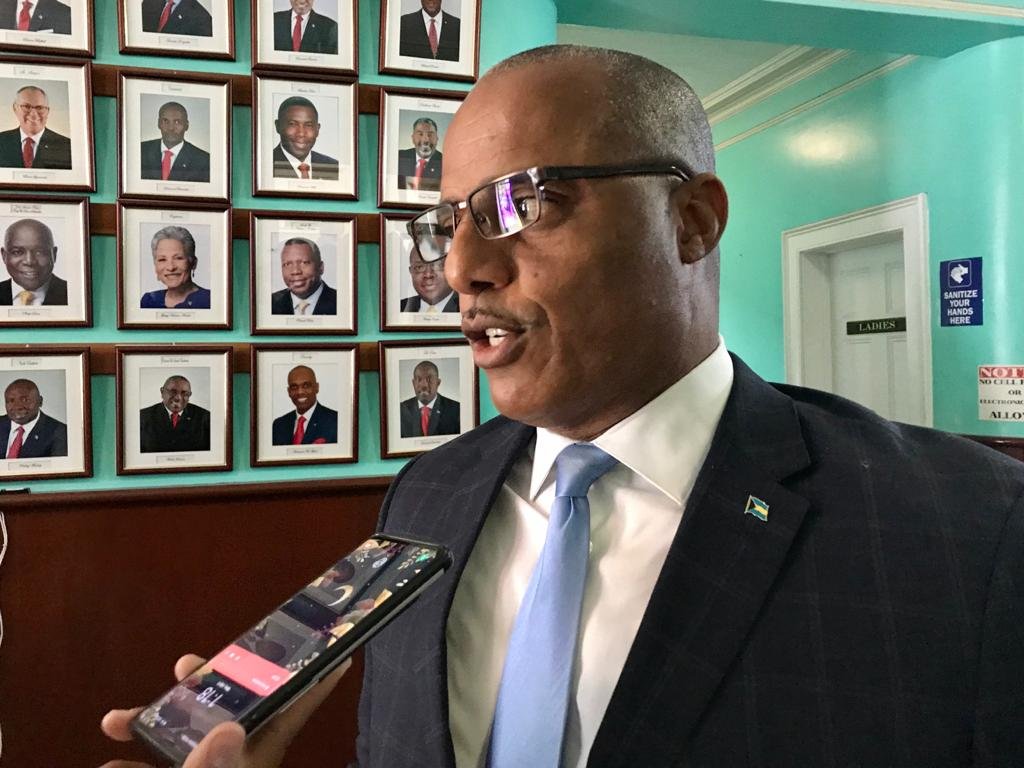Minister with responsibility for elections says no citizen will be disenfranchised or put at risk
NASSAU, BAHAMAS — The government is seeking to change the way Bahamians register to vote in the next general election to ensure no grouping is disenfranchised because of health concerns amid the ongoing coronavirus pandemic, according to Minister of National Security Marvin Dames.
“We are going to have to adjust and we are going to have to adjust quickly, recognizing the period that we are in,” Dames told Eyewitness News.
“The last thing we would want is the disenfranchisement of the voter.
“I would hate to have to see a large representation of voters, meaning you know, seniors with comorbidity issues refusing to come out because of the [health] challenges.
“We’re very cognizant of that and the parliamentary commissioner and his team have been working overtime to present options; to research options and make them available to this government.
“By way of consultation, we’ll get that information out there.”
Asked for specifics, Dames said the public should have a clear understanding of the way forward in short order.
“As we have to take into account that we have to register certainly before the next election, close to 200,000 people the question that we must be asking ourselves is do we want 200,000 people standing on lines, especially our seniors, on these long lines, stacked up on one another?” Dames asked.
“Does that make sense? Is that the direction we want to go?
In a separate interview, Parliamentary Commissioner Philip Turner told Eyewitness News there was consideration to change the law to maintain the present register and create a permanent register, though the decision was for the government to make.
He said due public notice will be provided prior to the voter registration exercise.
Voter turnout in the last general election was 88 percent with 160,409 registered voters casting their ballots of the 181,543 registered voters.
Other jurisdictions have as an alternative to in-person registering and voting, resorted to remote technologies such as online registration and voting by mail.
An Inter-American Development (IDB) report authored by IDB senior research economist Razvan Vlaicu in April, said the pandemic’s “deep impact” on many developing countries is likely to extend far beyond their economies as “developing countries, like those in Latin America and the Caribbean, apart from weaker economies, also have more fragile democracies”.
A number of countries in the Americas have postponed general elections due to the pandemic.
For example, Chile’s election slated for April 26 has been pushed back to October 25.
The presidential and legislative elections for the Dominican Republic scheduled for May 17 was moved to July 5.
The election proceeded on July 5 despite the country recording 1,241 infections on Election Day — the highest number of cases in a single day.
Voter turnaround was just over 55 percent, lower than the 2016 election turnout of nearly 70 percent.
Safety protocols required for voting day using WHO resources, including the wearing of face masks, social distancing and disinfection of all identification cards, markers and ballot cards.
However, the Organization of American States reported long lines, and a lack of physical distancing despite the protocols in place.
“Notably, one of the nine members of that same agency tested positive to the virus on the day of the election,” according to the International Institute for Democracy and Electoral Assistance.
Luis Abinader, of the opposition part Modern Revolutionary Party, who won the election with more than 52 percent of the vote, tested positive for the virus in June.
The IDB report said: “Even in cases where elections do go ahead as scheduled, turnout may be considerably lower, particularly among elderly and vulnerable populations. The poor and less educated normally vote in proportionally smaller numbers. Amidst the pandemic, they face greater daily challenges and are even less informed.”
In June 2018, Dames said the government was preparing for the implementation of electronic voting for the next general election.
However, according to sources, there is not sufficient time to implement electronic voting and address the myriad of associated challenges before the next election.






